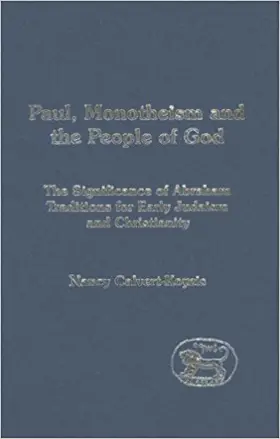

Paul, Monotheism and the People of God: The Significance of Abraham Traditions for Early Judaism and Christianity
in Library of New Testament Studies
Pages
224
Publisher
T&T Clark
Published
2004
ISBN-13
9780567289780
While many scholars have noticed the significance of Abraham traditions in Early Christianity, none have analysed early Jewish or Pauline texts from the perspective of the most prevalent tradition about Abraham: his rejection of idolatry for monotheistic faith. Here, Nancy Calvert-Koyzis examines early Jewish documents in which the tradition of Abraham and monotheism plays a significant part. The early Jewish documents that she analyses include works from both Philo and Josephus, as well as the Biblical Antiquities, Jubilees, and the Apocalypse of Abraham. Each document is analysed with the historical context in mind in order to ascertain how this monotheistic tradition, and in some cases the tradition of Abraham's obedience of the law, functioned to define who were members of the people of God.
Next the author analyses Paul's epistles to the Galatians and Romans from the standpoint of the tradition of Abraham's rejection of idolatry from monotheism. She finds that Paul most probably had traditions of Abraham's monotheistic faith in mind as he redefines the people of God in Christ. In contrast to the use of monotheistic traditions about Abraham to define the people of God in early Jewish literature, Abraham's monotheistic faith in the Pauline texts is now fulfilled in Christ. Ironically, those who maintain that obedience to the law is necessary for members of the people of God are shown to be idolaters in contrast to those who embrace fulfilled monotheistic faith like their forefather, Abraham.
Next the author analyses Paul's epistles to the Galatians and Romans from the standpoint of the tradition of Abraham's rejection of idolatry from monotheism. She finds that Paul most probably had traditions of Abraham's monotheistic faith in mind as he redefines the people of God in Christ. In contrast to the use of monotheistic traditions about Abraham to define the people of God in early Jewish literature, Abraham's monotheistic faith in the Pauline texts is now fulfilled in Christ. Ironically, those who maintain that obedience to the law is necessary for members of the people of God are shown to be idolaters in contrast to those who embrace fulfilled monotheistic faith like their forefather, Abraham.